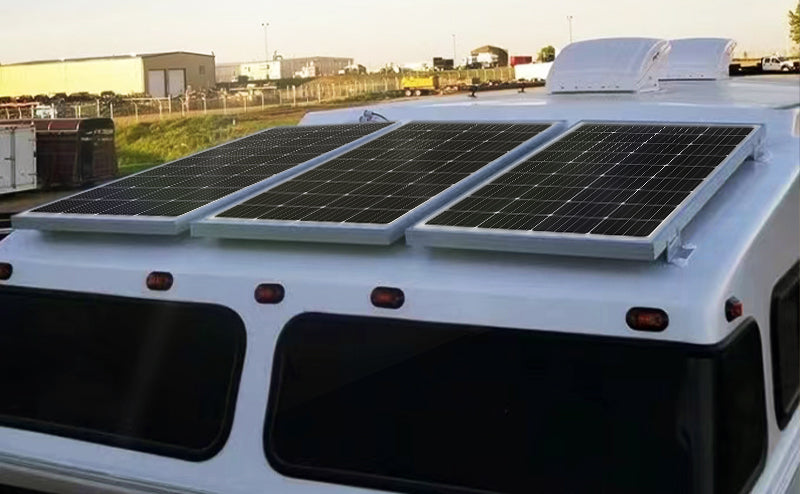
If you’re an avid RVer, especially one who enjoys boondocking and remote campsites, you know that having a reliable source of power is essential. This is where RV solar panels come in. RV solar panels are a great investment for anyone who wants to travel off-grid and still have access to electricity. In this blog post, we’ll go over the benefits of solar panels for your RV, how they work, and what you should look for when purchasing them.
Solar panels work by converting the sun’s energy into usable electricity. They do this using photovoltaic cells, which are made of silicon and other materials that absorb sunlight and convert it into electrical energy. The electricity produced is direct current (DC), which can be used to power your RV’s appliances and devices or stored in batteries for later use.
The photovoltaic cells are arranged in a solar panel, which is usually mounted on the roof of an RV. The panels are connected to a charge controller, which regulates the flow of electricity to the battery bank. The battery bank stores the energy produced by the panels, so you can use it later when the sun isn’t shining.
When you need to use the electricity stored in the batteries, it’s converted to alternating current (AC) by an inverter. AC power is what most RV appliances and devices use, so the inverter is essential for making the energy usable.
There are several benefits to RV solar panels. Firstly, solar panels allow you to generate your own electricity, reducing your reliance on traditional power sources. This can be especially beneficial when traveling to remote areas where traditional power sources are not available.
One of the most significant benefits of solar panels is that they offer a clean and renewable source of energy. Solar panels don’t produce any harmful emissions, which means that you can enjoy your travels without harming the environment. Additionally, solar panels can help reduce your reliance on fossil fuels and save you money on fuel costs.
There are quite a few factors to take into consideration when it comes time to choose which solar panels you’ll install. The power your RV needs, the panel types and your budget are all important considerations. Here’s how to narrow down your options:
The first factor to consider when selecting solar panels for your RV is your power requirements. The amount of power you need will depend on the size of your RV, the number of appliances and devices you have, and how often you plan to use them. Make a list of all the devices and appliances you plan to power with your solar panels and add up their wattage requirements. This will give you a rough idea of how many watts of solar power you’ll need.
The size and configuration of your solar panels will also be a key consideration. If you have a large RV or plan to use a lot of power, you may need larger solar panels or multiple panels. Smaller RVs or those with lower power requirements may only need a single panel. In addition, you’ll need to consider the orientation and angle of your panels to ensure maximum sunlight exposure. Ideally, your panels should be installed at a 30-degree angle facing south (in the Northern Hemisphere) for optimal performance.
There are several types of solar panels to choose from, each with its own benefits and drawbacks. The most common types of panels are monocrystalline, polycrystalline and thin-film. Monocrystalline panels are the most efficient and durable but are also the most expensive. Polycrystalline panels are less expensive but also less efficient. Thin-film panels are the least expensive but also the least efficient and durable.
Another key consideration when selecting solar panels for your RV is how they’ll be mounted. There are several ways to mount solar panels on an RV, including roof-mounted, ground-mounted, and portable options. Roof-mounted panels are the most common and are generally the most efficient, but they can be difficult to install and may require modifications to your RV. Ground-mounted panels are easier to install but may take up valuable space on your campsite. Portable panels are the most versatile but may require additional equipment such as stands or brackets.
Finally, you’ll need to consider your budget when you select solar panels for your RV. Solar panels can be expensive, and the cost can vary widely depending on the type and size of the panels. In addition, you’ll need to factor in the cost of installation and any additional equipment such as charge controllers, inverters and batteries. Consider your budget carefully and try to strike a balance between cost and performance.
Article from: Wuzeck
For more information, please click here: https://wuzeck.com/